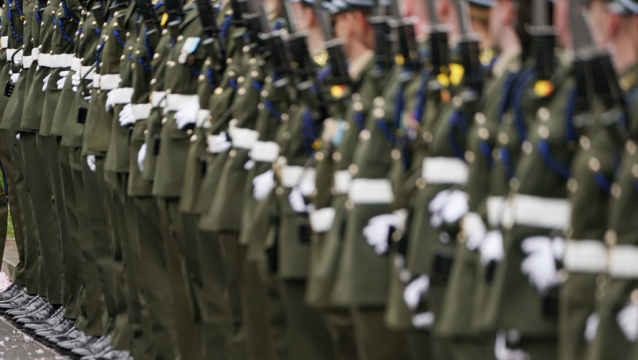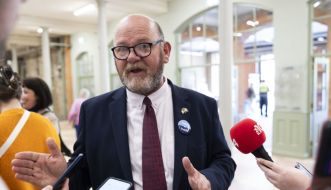A Defence Forces order prohibiting attendance at unofficial protests and parades by a serving soldier is unconstitutional, the High Court has found.
Sergeant Martin Bright, who is also the deputy general secretary of the Defence Forces representative organisation, PDFORRA, brought a challenge over the August 29th, 2018, order by since-retired Deputy Chief of Staff Major General Kevin Cotter.
The case centred on whether Sgt Bright was entitled to attend a protest in Dublin in September 2018 over pay and conditions in the armed forces, organised by a newly formed and separate group calling itself Wives and Partners of the Defence Forces (WPDF).
Sgt Bright said, as a result of Maj Gen Cotter's order, he did not attend the demonstration as he believed the order meant he could be in breach of part of the 1954 Defence Act (Section 103.1) prohibiting Defence Forces members from joining, being a member of or subscribing to any political organisation, society or secret society.
He brought High Court proceedings against the Minister for Defence and the State claiming, among other things, the order was in breach of his rights under the Constitutional and European Convention on Human Rights.
The defendants denied the claims.
On Tuesday, Mr Justice Mark Sanfey ruled Sgt Bright had succeeded in establishing that Maj Gen Cotter's August 2018 order was in breach of the soldier's constitutional rights and outside his powers as being disproportionate.
Given those decisions, the judge did not consider the reliefs sought under the European Convention were appropriate or necessary.
Earlier, the judge said the attendance of soldiers at the WPDF protest in civilian clothing, in circumstances where they pointedly took no part in the event, other than listening and observing, seemed to be indicative of a conscious decision not to “subscribe to” the entity which organised the event.
Properly construed, the relevant section of the Defence Forces Act does not contain a general prohibition on political activity as such, he said.
The General Staff may be entirely correct as to the desirability of keeping a strict separation between military matters and involvement in political affairs, he said.
However, there is no statutory basis for compelling members to observe this separation, other than the limited imperative set out in the Act, he said.
In his view, the order was a “blunt instrument” which went much farther than necessary. There was no indication that the nature of the WPDF event in September 2018 was considered, he said.
There were no indications in advance of the events that they would be conducted other than in an orderly, respectful and non-confrontational manner, and the evidence made it clear that this is what transpired, he said.
He did not consider the "somewhat nebulous and ill-defined purpose of the order", insofar as it can be ascertained at all, was to warrant "a wholesale, blanket curtailment of the rights protected by Article 40 of the Constitution".
The judge also said the issue of what members of the Defence Forces may or may not do off duty in relation to matters which might be deemed "political" is a difficult issue.
However, he said, it is an area which requires regulation by the Minister in a manner which takes account of the interests and sensitivities of all concerned.







